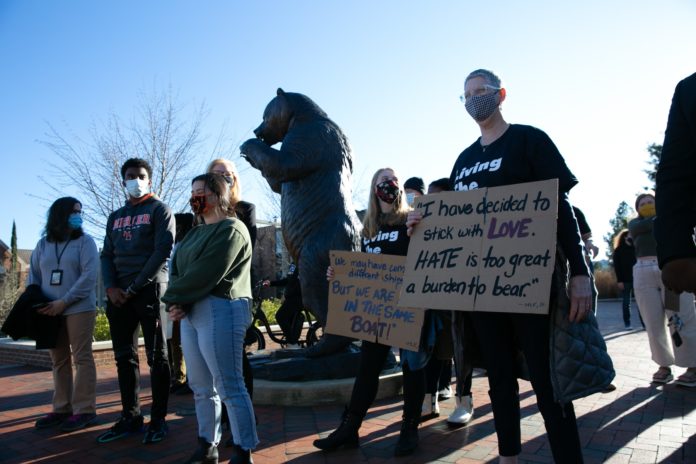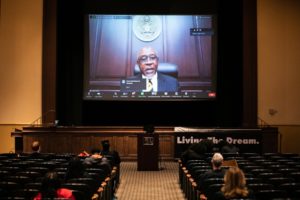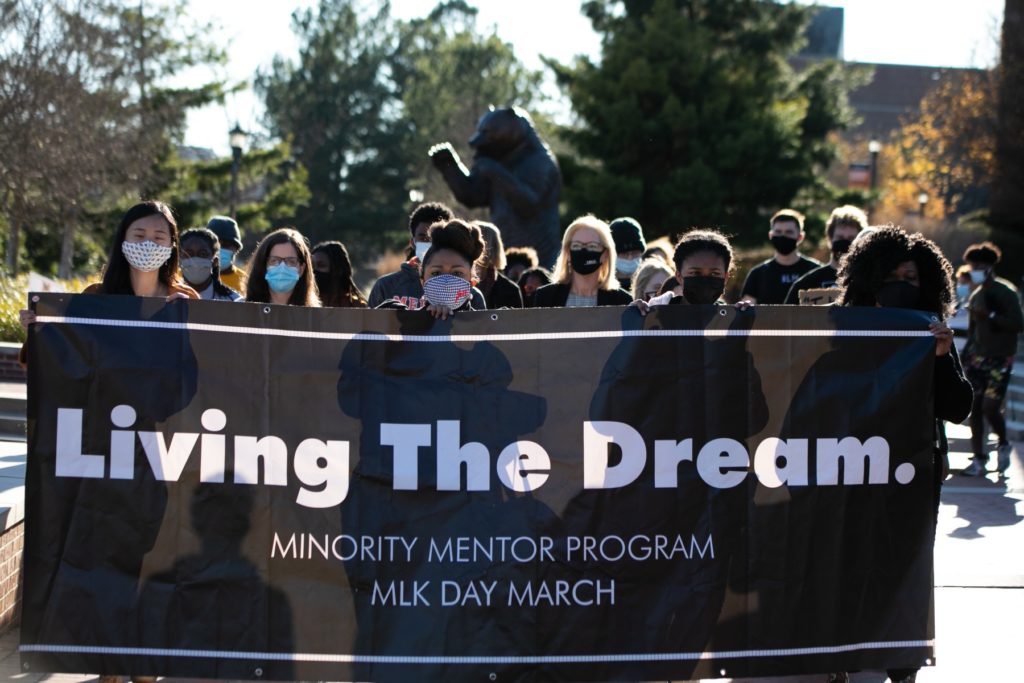
The quest for equal rights and justice sought by Dr. Martin Luther King Jr. continues as the country observes the holiday named in his honor.
Judge W. Louis Sands, the keynote speaker at Mercer University’s third annual Living the Dream event on Jan. 14, reminded students, faculty and staff of this as they gathered in Willingham Auditorium and virtually on Zoom.
“In 2021, notwithstanding significant progress, the reality of racism and its impact continue and find support. Change is resisted. Today, it is still necessary to note and point out that Black lives matter. The need to resist, push and nudge remains,” said Sands, a 1971 graduate of Mercer’s College of Liberal Arts and Sciences and a 1974 graduate of the School of Law.
“In short, the work of Dr. King was not completed. His goals were not entirely reached. Much work and many important goals remain.”
Fairness and justice, Sands said, begin with the individual and move out through public and private organizations and institutions. It cannot be left to happenstance or serendipity.

Growing up as a Black man in the Deep South, Sands resisted inequities in his own way.
As a child, he was expected to respond to questions from adults with “Yes, ma’am” or “No, sir.” Meanwhile, he observed whites referring to Blacks as “boy” and “gal,” regardless of their age, and they did not use such honorific titles.
“That racially tainted etiquette bothered me,” he said. “Since I was articulate and had good command of the King’s English, I used that to my advantage without incident. I simply declined to use the words ‘yes’ or ‘no.’
“Instead, I answered in complete sentences in the affirmative or negative as appropriate. … In my own way, I refused to obey and cooperate with the demeaning practice.”
Later, when Sands was in high school, he worked at a cannery. When he arrived at work and went to clock in, there were two separate lines, one for Blacks and one for whites.
Although it wasn’t forced and having the two separate lines was illegal, the practice persisted.
Sands said he was concerned that the Black line was longer than the white line because each minute that he wasn’t on the clock, he wasn’t making money.
One day, he left the long line and went straight to the other clock, which by that time didn’t have a line at all. He clocked in and went to work. No one said a word.
“I did the same thing the next day, except I went directly to the short line — the line which had been only for white employees. Still, nothing happened,” Sands said. “By the end of the week, there were still two clocks, but the lines were no longer racially segregated. I had seen myself as simply acting in my own self-interest, but the impact was much more.
“Though a relatively small matter, it was positive, affirming and empowering. Without intending to, I had inspired others to act accordingly.”
Throughout the years, his courage and hard work led Sands to be the first Black person to serve in several prominent legal roles. In 1994, President Bill Clinton appointed him to the U.S. District Court for the Middle District of Georgia, where he continues to serve today.
A chance to reflect and commit
Martin Luther King Jr. Day provides Americans the chance to reflect on the anti-discrimination work of the past and continue the journey today, Sands said.
“Carefully, honestly and realistically survey and examine (Dr. King’s) life, his causes and his work. It will be instructive,” he said, reminding the audience that Dr. King was not universally popular while he was alive. “You will understand that fighting systemic racism and inhumanity will be challenging, not for the faint of heart or loosely committed.
“Actions taken may not be popular. They will likely be criticized, rebuffed and truth itself denied. There may be attempts to mischaracterize and vilify. All of that happened to King and others. Yet he was clear in his goals, focused, and remained committed to the very end.”
On Aug. 28, 1963 — five years before he was assassinated for his prominent role in the Civil Rights Movement— Dr. King gave his now famous “I Have a Dream” speech during the March on Washington.
In a symbolic gesture, about 40 students, faculty and staff marched silently from the Bear statue near the University Center to Willingham to hear Sands speak in the socially distanced auditorium. Even more attendees joined the event via Zoom.
“Fifty-eight years later, I think it’s time to continue to honor Dr. King’s legacy, his dream and his teachings more than ever,” said Dr. Ansley Booker, director of Diversity and Inclusion Initiatives at Mercer. “Today we must continue to embrace change, equality and freedom for all. …
“The next steps (in fighting against social injustice) are to continue to advocate for human rights, vote, lend a voice to the ear of democracy, challenge oppression at every step, and strive to leave an individual legacy that will ensure equity, access and justice for all Mercerians and Americans.”









